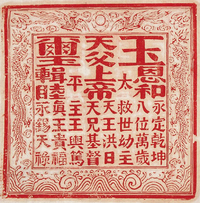
Back Тайпин Bulgarian Tái-bìng-tiĕng-guók CDO Nebeská říše velkého míru Czech Himmlisches Königreich Taiping German Ουράνιο Βασίλειο των Ταϊπίνγκ Greek Reino Celestial Taiping Spanish Royaume céleste de la Grande Paix French 太平天國 GAN Thai-phìn-thiên-koet HAK Kerajaan Surgawi Taiping ID
This article needs additional citations for verification. (January 2022) |
Taiping Heavenly Kingdom (1851–1861) 太平天囯 God's Heavenly Kingdom (1861) 上帝天囯 Taiping Heavenly Kingdom of the Heavenly Father, Heavenly Brother, and Heavenly King (1861–1864) 天父天兄天王太平天囯 | |||||||||
|---|---|---|---|---|---|---|---|---|---|
| 1851–1864 | |||||||||
| Seal of Taiping Heavenly Kingdom 太平天囯之璽  | |||||||||
 Outline of the Taiping Heavenly Kingdom
Held at various time during the Taiping Rebellion
Early period
Late period | |||||||||
| Capital | Tianjing (now Nanjing) | ||||||||
| Religion | God Worshipping Society | ||||||||
| Government | Theocratic absolute monarchy | ||||||||
| Taiping Heavenly King | |||||||||
• 1851–1864 | Hong Xiuquan | ||||||||
• 1864 | Hong Tianguifu | ||||||||
| Kings/Prince | |||||||||
• 1851–1852 | Feng Yunshan (South King) | ||||||||
• 1851–1856 | Yang Xiuqing (East King) | ||||||||
• 1851–1852 | Xiao Chaogui (West King) | ||||||||
• 1851–1856 | Wei Changhui (North King) | ||||||||
• 1851–1863 | Shi Dakai (Wing King) | ||||||||
• 1859–1864 | Hong Rengan (Shield King) | ||||||||
| Historical era | Late modern period | ||||||||
| 11 January 1851 | |||||||||
| 19 March 1853 | |||||||||
| 1856 | |||||||||
| 19 July 1864 | |||||||||
• Capture of Hong Tianguifu | 25 October 1864 | ||||||||
| Currency | Shengbao (cash) | ||||||||
| |||||||||
| Today part of | China | ||||||||
| Taiping Heavenly Kingdom | |||||||||||||||||||||||||
|---|---|---|---|---|---|---|---|---|---|---|---|---|---|---|---|---|---|---|---|---|---|---|---|---|---|
 Royal seal of the Taiping Heavenly Kingdom | |||||||||||||||||||||||||
| Traditional Chinese | 太平天囯 | ||||||||||||||||||||||||
| Simplified Chinese | 太平天国 | ||||||||||||||||||||||||
| Literal meaning |
| ||||||||||||||||||||||||
| |||||||||||||||||||||||||
The Taiping Heavenly Kingdom, or the Heavenly Kingdom of Great Peace (1851–1864), was a theocratic absolute monarchy which sought to overthrow the Qing dynasty. The Heavenly Kingdom, or Heavenly Dynasty,[1][a] was led by Hong Xiuquan. Its capital was at Tianjing, present-day Nanjing. The unsuccessful war it waged against the Qing is known as the Taiping Rebellion.
A self-proclaimed younger brother of Jesus Christ[3] and convert to Protestant Christianity, Hong Xiuquan led an army that controlled a significant part of southern China during the middle of the 19th century, eventually expanding to a size of nearly 30 million people. The rebel kingdom announced social reforms and the replacement of Buddhism, Confucianism, Chinese folk religion, and Islam by his form of Christianity, holding that he was the second son of God and the younger brother of Jesus. The Taiping areas were besieged by Qing forces throughout most of the rebellion. The Qing government defeated the rebellion with the eventual aid of French and British forces.
- ^ Spence (1996), Chapter 22: "Hong Xiuquan ordered his troops and followers to drop the name Taiping, and instead to use the one word "Heavenly", to pay proper homage to God the Father. As Li later phrases his unease: The Heavenly King always used heavenly words to admonish people. We, his officials, did not dare to challenge him, but let him give what names he wanted. Calling them "Heavenly Dynasty, Heavenly Army, Heavenly Officials, Heavenly People, Heavenly Commanders, Heavenly Soldiers and Royal Troops""
- ^ 太平天国の階級構成原理とその基本性格
- ^ Michael, Franz H.; Chang, Chung-li (1966), The Taiping Rebellion: History and Documents, I: "History", Seattle: University of Washington Publications on Asia. p. 35 [ISBN missing]
Cite error: There are <ref group=lower-alpha> tags or {{efn}} templates on this page, but the references will not show without a {{reflist|group=lower-alpha}} template or {{notelist}} template (see the help page).
© MMXXIII Rich X Search. We shall prevail. All rights reserved. Rich X Search